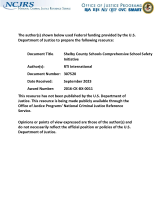Community service
Programs and Services for Black Male Survivors of Community Violence: What’s Effective?
Broadband Communications Prioritization and Interoperability Guidance for Law Enforcement
Five Things About Community-Based Terrorism Prevention Programs
Examining Avoidance, Victimization Risk, and Perceptions of Community Safety in Latinx Communities
A Whole Community Approach to Hate Crime Reduction: Research to Improve Prevention, Reporting, and Victim Support
Shelby County Schools Comprehensive School Safety Initiative
Pathways to Resilience: Assessing the Impact of Juvenile Justice Reforms in Oklahoma
Evaluation of the California Human Trafficking Victim Assistance Grant Program
What Works to Reduce Violent Gun Crime in Focused Deterrence Initiatives? Estimating the Effect of Services and Enforcement in Facilitating Desistence Among Prolific Violent Offenders
Assessing the Effectiveness of the Second Chance Act Grant Program through a Phased Evaluation Approach Using an Implementation Science Mixed Methods Approach
Inclusive Research: Engaging People Closest to the Issue Makes for Better Science & Greater Impact; 2023 NIJ Research Conference Plenary
This panel will discuss what inclusive research is, how to conduct it, and what issues and challenges exist about engaging in it. “Inclusive research” has its history as a participatory research method designed to ensure people closest to the issue or problem under study are authentically engaged in the research process rather than simply being “research subjects.” While community-based participatory research has begun to take on greater prominence in the criminal justice realm, such efforts are largely confined to qualitative research inquiries.
See the YouTube Terms of Service and Google Privacy Policy
Project SECURE: Keeping Kids Safe in San Francisco Unified School District
Understanding the Criminal Justice and Health Care Needs of Latinx Victims of Hate Crime and Bias Victimization
What works to reduce violent gun crime in focused deterrence initiatives? Estimating the effect of services and enforcement in facilitating desistence among prolific violent offenders in Tampa
Improving Strategies for Investigating & Prosecuting Hate Crimes: A National Yet Local Approach
How Do “Credible Messenger” Mentors Promote Youth Development? A Retrospective, Longitudinal Study in Atlanta, Birmingham, and Houston
Effects of School Resource Officers on School Crime and Responses to School Crime
Evaluation of Technology-based Advocacy Services (ETA): Technical Report, Executive Summary
Evaluation of Technology-based Advocacy Services (ETA): Technical Report
Leveraging Technology to Support Prisoner Reentry
Taking Stock: An Overview of NIJ's Reentry Research Portfolio and Assessing the Impact of the Pandemic on Reentry Research
Over several decades, the National Institute of Justice (NIJ) has made significant contributions to the field of reentry, specifically what works for whom and when. In recent years, however, the global pandemic has made it increasingly difficult to conduct research on and with populations involved with the justice system. During this time, many researchers assessing various justice-related outcomes were unable to continue their inquiries as planned due to a lack of access to their populations of interest, forcing many to pivot and rethink their research designs.
See the YouTube Terms of Service and Google Privacy Policy








